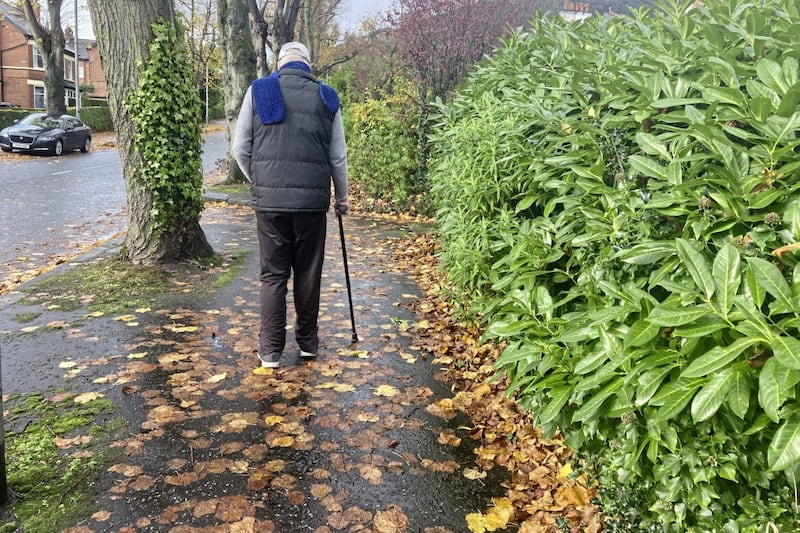DURING my life I have come across suicide on several occasions. The first time was when I was a teenager and involved the lady across the road.
Then I can remember the day, years later, when I drove to Banbridge to meet a mother who had phoned me in distress; her son had taken his own life.
We met in a quiet corner of a roadside hotel. Her son was 19 and, by coincidence, so was mine and we were two mothers sharing something unfathomable.
On another occasion, one evening after my TV programme, the security man stopped me at the door: "There's a woman who wants to talk to you, she sounds very upset."
So she was, she told me she felt there was nothing to live for. We talked for almost two hours. At the end of our talk she reassured me she wouldn't do anything.
That was over 20 years ago, when suicide was less widely spoken about and even acknowledged. Today there are a range of supports and services at the end of a telephone or even online, including the Samaritans, Lifeline and Pips.
September 10 was World Suicide Day - did you notice? - but this is a topic to be aware of every day.
In a research paper from the NI Assembly Research and Information Service on April 14 2021, Dr Lesley-Ann Black considers the complex issue of suicide.
For instance: "Research indicates that one in eight children in Northern Ireland report having suicidal thoughts or having attempted suicide. Men are more likely to die by suicide than women, although more women attempt suicide. Suicide rates in the most deprived areas are three times higher than the least deprived areas."
There are also believed to be particular problems linked to Northern Ireland: "The strong link between suicide and mental illness is well established. Mental ill health is one of the leading causes of disability in Northern Ireland.
"Moreover, research suggests that Northern Ireland, being a post-conflict society, experiences 20-25 per cent higher levels of mental health illness compared to the rest of the UK, and around 1 in 5 adults have a diagnosable mental health condition at any given time.
"There are also significantly higher levels of depression in Northern Ireland than in the rest of the UK, higher antidepressant prescription rates, higher incidences and presentations for self-harm (albeit that in many cases, people who self-harm do not present for medical attention and are not visible to healthcare professionals) and high rates of post-traumatic stress disorder."
Elsewhere, the report notes alcohol and drug misuse can be a factor: "A significantly higher percentage of young people who died by suicide in Northern Ireland had a history of alcohol and/or drug misuse when compared to the rest of the UK."
The Department of Health's suicide strategy, 'Protect Life 2', aims to reduce the suicide rate in Northern Ireland by 10 per cent by 2024 and "to ensure suicide prevention services and support are delivered appropriately in deprived areas where suicide and self-harm rates are highest".
Online Publication
The author Declan Henry published his online booklet Suicide: Reasons To Live earlier this month. He interviewed people from the UK and Ireland, including bereaved family members, survivors of a suicide attempt and those who had experienced strong suicidal thoughts at some time during their lives.
He discovered that in the world roughly one death by suicide will happen every 40 seconds, while in the UK and Ireland there is a daily average of 19 people - probably a conservative figure, as the effect of Covid-19 and the impact of lockdown on people's mental wellbeing is still to be calculated.
His research underlines the complexities that lead to suicide or an attempted suicide.
He writes of young people who talk more openly than past generations.
"Children need to be educated about emotional health and taught a vocabulary that equips them to describe their feelings," he says.
"Society often, unfairly, feels that life is much easier for the current generation of young people compared to their predecessors. Young people binge on many things, so it is easy to see why their mental health becomes affected.
"They are constantly fed negativity by the media and subjected to graphic and violent images through online games. Many young people hardly talk at home any more because they are busy with their 'virtual life' on their phones.
"Is it any wonder, therefore, that some of them develop a sense of hopelessness for the future?"

Where Is The Help?
In general Declan underlines the fact that the mental health system is in a state of disarray.
"Patients are often left feeling they are brushed aside. GPs have limited time and the patient is usually given a prescription for anti-depressants and told to come back in a few weeks. Physical needs are met but not mental health needs."
An interviewee named Frank tells Declan: "If someone tells you they feel suicidal, they are asking for help. Some people write posts on Facebook stating their intention to take their own lives because they have no place else to talk.
"Many such people wear masks in public, even at home - where there are no signs that anything is wrong."
Declan includes a wide range of suicide prevention strategies and emphasises the importance of talking out loud, initiating discussion in general but specifically and sensitively with the person you suspect is having suicidal thought.
You can download Declan's booklet free of charge from declanhenry.co.uk
When life is difficult, Samaritans are here - day and night, 365 days a year. You can call them on 028 9066 4422 or 116 123, email jo@samaritans.org, or visit www.samaritans.org to find your nearest branch and local support groups.










